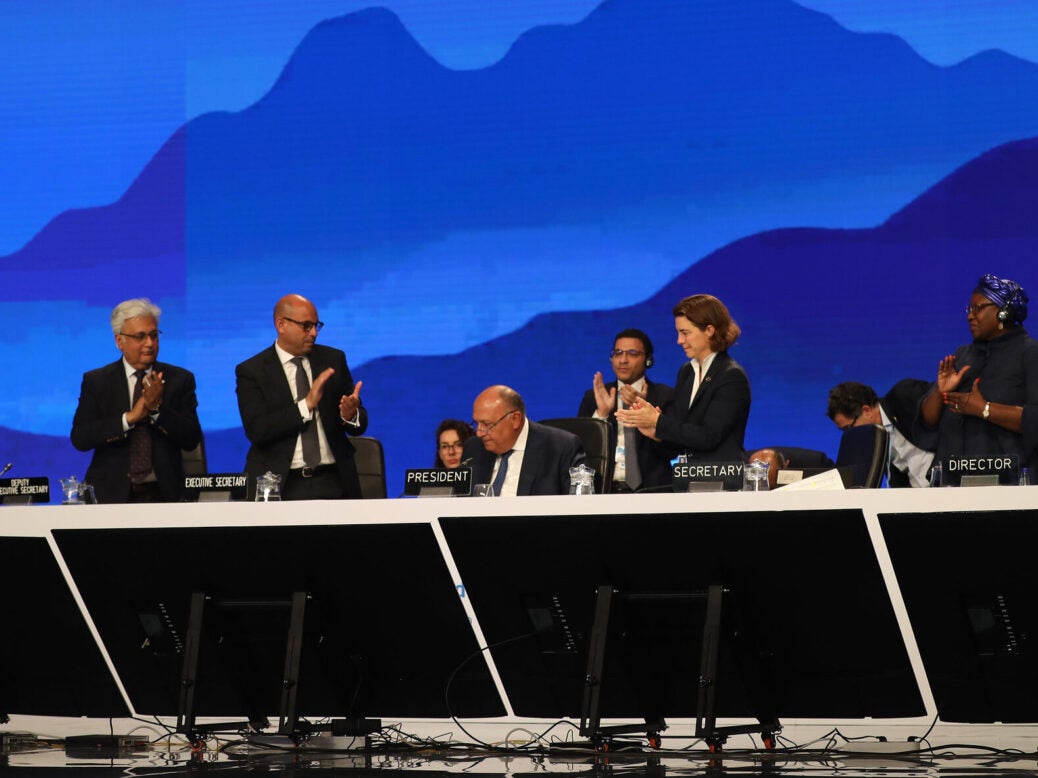
The raised profile for food and farming at COP 27 better reflects the contribution the agri-food sector could make to global emission reductions.
The COP 27 climate conference in Sharm el-Sheikh closed on Sunday (20 November) in much the same manner as COP 26 did in Glasgow a year ago, with a mixture of relief among delegations that they had something to show for their two weeks at the luxury Egyptian resort, and widespread dissatisfaction among external stakeholders with what the conference had achieved.
Those striving for a more sustainable, climate-friendly food system, however, may see COP 27 in a more favourable light than other observers. Agriculture and food had a substantially higher profile than at previous COPs, with the conference witnessing a number of significant announcements relating to addressing climate impacts in food and agriculture.
Dedicated food pavillion
For the first time at a COP there was a dedicated food and agriculture pavilion hosted by the UN Food and Agriculture Organization (FAO), in collaboration with the Rockefeller Foundation and inter-governmental agricultural research organisation CGIAR. Also new this year was the Food Systems pavilion, hosted by an international coalition of food, agricultural and environmental NGOs, with backing from the EU, which showcased actions aimed at creating healthier, more resilient and more equitable food systems.
The FAO announced during COP 27 it intends to publish, by next year’s conference, a climate plan for the agri-food sector to show how food and farming can align with the UN goal of limiting global warming to 1.5°C. FAO deputy director Zitouni Ould-Dada made the commitment at an event hosted by FAIRR, an organisation advising investors on material ESG issues in the animal protein sector.
As the conference drew to a close, a group of the world’s largest agricultural commodity corporations, facilitated by the World Economic Forum (WEF) and the World Business Council for Sustainable Development (WBCSD), launched the Agriculture Sector Roadmap to 1.5°C. The 14-strong coalition comprises leading firms from the livestock, soy and palm oil sectors, namely ADM, Amaggi, Bunge, Cargill, COFCO International, Golden Agri-Resources, JBS, Louis Dreyfus, Marfrig, Musim Mas, Olam Group, Olam Food Ingredients, Viterra and Wilmar International.
Of particular note was the launch by the World Health Organization (WHO) of the Initiative on Climate Action and Nutrition (I-CAN), aimed at supporting the development of “win-win” policy solutions that help tackle climate change and improve nutrition, particularly for children and vulnerable groups.
FAST initiative launched
The overlap between climate-friendly and healthier diets represents a fortuitous coincidence that remains relatively unexplored by policymakers or food companies alike. Even the recently launched, broad-ranging US national food strategy makes little reference to climate change while attempts to integrate environmental criteria into the Dietary Guidelines for Americans have been unsuccessful.
Meanwhile, in collaboration with the Egyptian COP presidency, the FAO launched the Food and Agriculture for Sustainable Transformation (FAST) initiative, aimed at facilitating financing of projects to decarbonise and boost resilience of agricultural sectors in the most vulnerable communities.
Given that farming and food production account for around a third of global greenhouse gas emissions, the lack of attention and investment on agri-food within national climate strategies represents a glaring omission.
A recent report, published by the Global Alliance for the Future of Food, found that only 3% of public finance to tackle climate change is directed at food systems, in stark contrast to the energy and transport sectors which combined account for around two-thirds of public climate expenditure.
While COP attendees from food and farming will have been pleased to see the importance of the agri-food sector being more fairly reflected at COP 27, reaction to the conference in general was mostly negative. The UN’s global effort to address climate change has ebbed and flowed over the 27 years since COP 1 in Berlin, enjoying a grand flourish in Paris in 2015 but losing momentum steadily ever since in the face of some severe headwinds.
The modest ambition and achievement at COP 27 will have done little to bolster the beleaguered UN-sponsored effort. What is officially known as the Sharm el-Sheikh Implementation Plan, finally agreed late on Sunday after much wrangling and compromise, represents fairly thin gruel, particularly when set against the huge cost – both in cash and carbon – of bringing all the parties physically together in one location.
While the creation of a “loss and damage” fund to provide financial assistance to poorer countries impacted by climate change appears to remove a long-standing stumbling-block in the Paris process, the thorny issue of who pays into the fund was put off until next year.
Meanwhile, COP 27 went no further than COP 26 towards agreement on phasing out fossil fuels, with only the commitment to “phase down” coal. In fact, the COP 27 agreement appears to make a concession on fossil fuels, promoting the use of renewables and “low-emission energy”, thought to provide a loophole enabling continued investment in natural gas as a “transition fuel”.
Sense of under-achievement
COP 21 in Paris in 2015 was undeniably a major geopolitical event and a milestone in combating climate change. COP 27 was nothing of the sort. World leaders came and went but this year’s conference underlined once again how climate change struggles for government bandwidth against more immediate challenges, especially when they are of the magnitude of the Covid-19 pandemic and the Ukraine conflict.
The palpable sense of under-achievement and disappointment following COP 27 was all too familiar. While failing to drive meaningful progress on national reduction targets and other commitments, COPs are increasingly being seen as networking jamborees for the ever-growing numbers of lobbyists, corporations, NGOs and other stakeholders that flock to the conference fringes.
The proliferation of fossil fuel lobbyists at COP 27 in particular raised eyebrows. A conference teeming with fossil fuel industry representatives that eschews a commitment to phase down all fossil fuels and gives a tacit thumbs-up to investment in natural gas is arguably beyond satire.
That said, it could be argued that the networking and cross-fertilisation of ideas taking place in the pavilions has in itself a crucial part to play in the global climate effort and could even mitigate the failure of a COP conference to increase reduction targets or seal more ambitious joint commitments.
The increased presence for food and farming this year suggests COP is developing as a venue for the promotion of climate change initiatives, discussion and the generation of ideas, while the more procedural, inter-governmental functions seem by contrast moribund.
With consensus on bolder commitments and faster progress on emissions likely to remain elusive, the broader outreach and purpose of the conferences could become even more important over the next few years.
While the widespread criticism of COP 27 by external stakeholders and some member states suggests extensive reorganisation is called for, possibly splitting the COP programme into smaller regional or issue-specific conferences, the UN is not known for turning on a sixpence.
In the short term, however, the UN can act in response to the specific criticism that the COP conferences have been “hijacked” by corporate interests, applying what was learned from the highly successful and widely praised Food Systems Summit (UNFSS), held during the UN General Assembly last September.
Need for greater inclusivity
After being criticised in its planning phase for favouring input from the corporate sector, the UN went to great lengths to make the UNFSS a multi-stakeholder event, for example establishing different stakeholder networks and holding a “pre-summit” involving a wide range of organisations.
The United Nations Framework Convention on Climate Change (UNFCCC) is highly trusted as a source of information and research. There is no indication the extensive corporate presence at COP conferences, and UN collaboration with organisations such as the World Economic Forum, have significantly eroded trust among NGOs or the public but fostering greater inclusivity and multi-stakeholder involvement at future COPs can only help in securing trust in the UN’s climate work while adding value to the conferences themselves.
In addition to assisting the participation of more of the most marginalised farming communities, the UN could look to build consumer awareness of the conferences.
While some adverse reaction to COP 27 alluded to lobbyists from the agri-food sector, it was without doubt the presence of as many as 600 representatives from the fossil fuel industry in Sharm el-Sheikh that sparked most dismay on the part of activists, only compounded when they learned COP 28 is to take place in Abu Dhabi.




